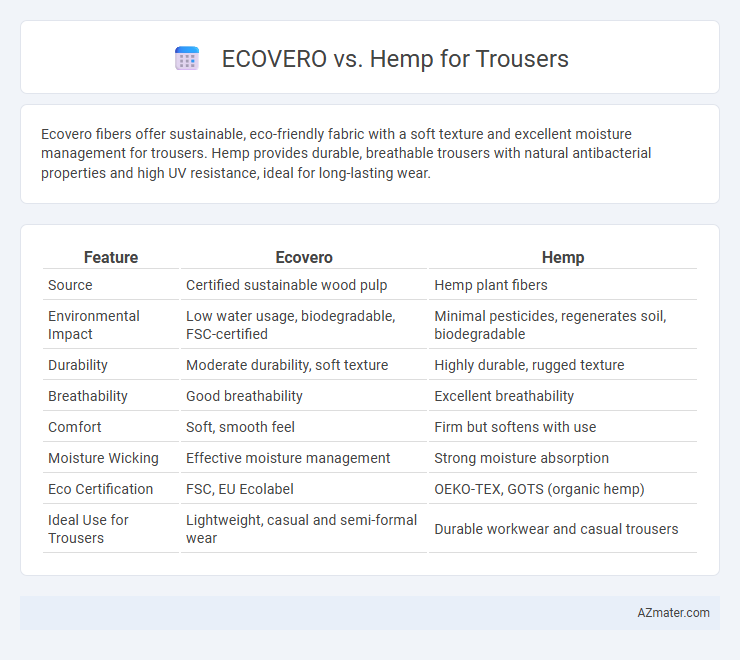Ecovero fibers offer sustainable, eco-friendly fabric with a soft texture and excellent moisture management for trousers. Hemp provides durable, breathable trousers with natural antibacterial properties and high UV resistance, ideal for long-lasting wear.
Table of Comparison
| Feature | Ecovero | Hemp |
|---|---|---|
| Source | Certified sustainable wood pulp | Hemp plant fibers |
| Environmental Impact | Low water usage, biodegradable, FSC-certified | Minimal pesticides, regenerates soil, biodegradable |
| Durability | Moderate durability, soft texture | Highly durable, rugged texture |
| Breathability | Good breathability | Excellent breathability |
| Comfort | Soft, smooth feel | Firm but softens with use |
| Moisture Wicking | Effective moisture management | Strong moisture absorption |
| Eco Certification | FSC, EU Ecolabel | OEKO-TEX, GOTS (organic hemp) |
| Ideal Use for Trousers | Lightweight, casual and semi-formal wear | Durable workwear and casual trousers |
Introduction to Sustainable Fabrics: Ecovero and Hemp
Ecovero is a sustainable fabric made from certified renewable wood sources with a low environmental impact, utilizing a closed-loop production process that reduces water and emissions. Hemp stands out as a durable natural fiber requiring minimal water and pesticides, known for its biodegradability and ability to improve soil health during cultivation. Both fabrics offer eco-friendly alternatives for trousers, combining sustainability with comfort and durability.
Ecovero: What Is It and How Is It Made?
Ecovero is a sustainable fabric made from certified renewable wood pulp, produced using eco-responsible processes that reduce environmental impact compared to traditional viscose. Its manufacturing involves dissolving wood fibers into a viscous solution, which is then regenerated into soft, breathable fibers ideal for trousers. Ecovero fabric offers superior moisture management and a lower carbon footprint, making it a preferred choice over hemp for eco-conscious apparel production.
Hemp Fabric: An Overview
Hemp fabric, derived from the Cannabis sativa plant, is renowned for its exceptional durability, breathability, and natural resistance to pests and mold. Compared to Ecovero, a sustainable viscose made from certified wood pulp, hemp offers superior strength and moisture-wicking properties, making it ideal for trousers that require long-lasting wear and comfort. Its eco-friendly cultivation demands minimal water and pesticides, positioning hemp fabric as a leading sustainable choice in the textile industry.
Environmental Impact: Ecovero vs. Hemp
Ecovero fibers, derived from sustainably managed wood sources, offer a low-impact production process with reduced water consumption and carbon emissions compared to conventional viscose. Hemp fabric, cultivated with minimal pesticides and requiring less water than cotton, provides a highly renewable and biodegradable option for trousers. While both materials support eco-friendly fashion, hemp's natural growth cycle and soil enhancement properties often result in a smaller environmental footprint over Ecovero's semi-synthetic manufacturing.
Comfort and Wearability Comparison
Ecovero fabric offers superior breathability and moisture-wicking properties, enhancing comfort during extended wear, while hemp fabric provides natural durability and softness that improves with each wash. Ecovero's sustainable viscose blend ensures lightweight draping and minimal irritation, making it ideal for trousers worn in warmer climates. Hemp trousers excel in abrasion resistance and temperature regulation, delivering robust performance without sacrificing comfort for everyday wear.
Durability and Longevity of Ecovero and Hemp Trousers
Ecovero trousers offer moderate durability due to their viscose-based fibers, which resist wear while maintaining eco-friendly qualities, but they may require careful washing to preserve longevity. Hemp trousers boast exceptional durability and longevity thanks to hemp's naturally strong, abrasion-resistant fibers that soften over time without losing structural integrity. Both materials provide sustainable options, but hemp excels in long-term wear and tear resilience compared to Ecovero's more delicate fabric composition.
Style and Aesthetic Differences
Ecovero fabric offers a smooth, silky texture with vibrant color retention that enhances sleek, modern trouser designs, making them ideal for polished, professional looks. Hemp trousers provide a natural, slightly coarse texture with visible fibers, contributing to a casual, earthy aesthetic that suits relaxed, bohemian styles. The drape of Ecovero supports structured silhouettes, while hemp fabric lends itself to looser, breathable fits emphasizing comfort and sustainability.
Cost Analysis: Pricing of Ecovero vs Hemp Trousers
Ecovero trousers generally cost more than hemp trousers due to the sustainable viscose production process and the technological innovation involved in Ecovero fabric manufacturing. Hemp trousers tend to be more affordable, benefiting from the plant's rapid growth and low resource requirements, which reduce raw material expenses. Price differences also reflect market demand, with Ecovero positioned in premium eco-fashion segments, while hemp appeals to budget-conscious environmentally aware consumers.
Maintenance and Care Requirements
Ecovero trousers require gentle machine washing in cold water and should be air-dried to maintain fabric integrity and color vibrancy. Hemp trousers benefit from similar care but can tolerate slightly higher temperatures and occasional tumble drying on low heat due to their natural durability and resistance to shrinkage. Both fabrics avoid bleach and harsh detergents to prolong lifespan and preserve texture quality.
Conclusion: Which Fabric Is Better for Trousers?
Ecovero fabric offers superior sustainability with biodegradable fibers derived from sustainably sourced wood pulp, making it lightweight and breathable, ideal for casual trousers. Hemp provides exceptional durability, natural resistance to wear, and moisture-wicking properties, enhancing comfort and longevity for workwear or outdoor trousers. Choosing between Ecovero and hemp depends on whether preference is given to eco-friendly softness and breathability or to ruggedness and durability in trousers.

Infographic: Ecovero vs Hemp for Trouser
 azmater.com
azmater.com